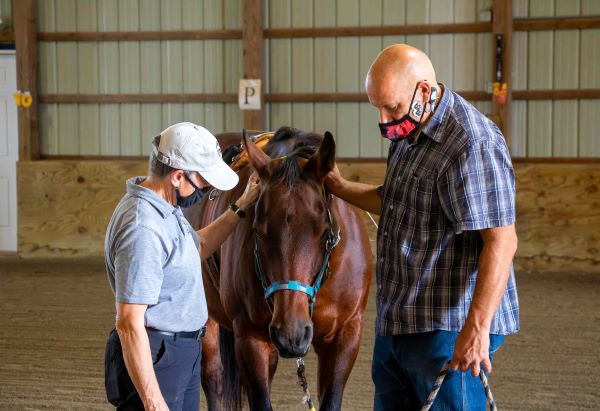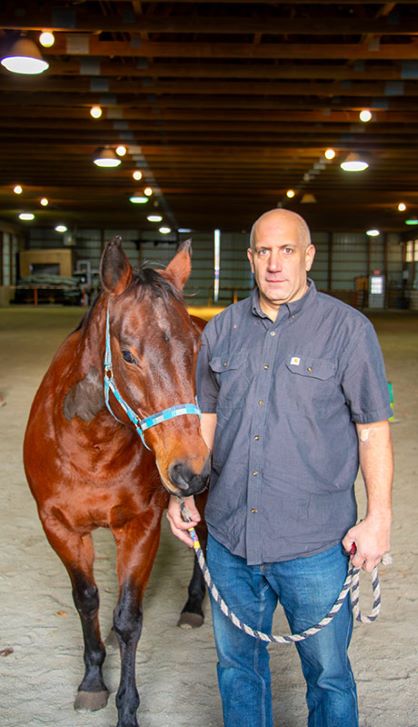Horse-Caring Helps Military Veterans With PTSD

Veterans with PTSD in a Rutgers pilot study, including U.S. Army Lt. Colonel Eric “Moose” Petrevich (at right), found working with horses eased their symptoms. Equine specialist Jane Burrows (left) of Special Strides coaches Lt. Col. Petrevich with a specially trained horse. Petrevich wears an electromyography sensor that measures stress.
Kyle Hartmann/Rutgers Equine Science Center
A Rutgers study may open a new frontier in mental health treatment.
NEW BRUNSWICK, NJ – A study by Rutgers University-New Brunswick researchers has shown that military veterans with post-traumatic stress disorder (PTSD), who participated in a program caring for horses, experienced an improved mental outlook and easing of symptoms.
Reporting results of the study in the journal Frontiers of Psychiatry, researchers said the insights could open the door to a new approach in mental health treatment for veterans, as many currently drop out of conventional therapy programs even though they have been shown to be effective.

U.S. Army Lt. Col. Eric “Moose” Petrevich finishes up an equine assisted services session as part of a study on a new treatment for veterans with PTSD.
Kyle Hartmann/Rutgers Equine Science Center
“When I think about what our veterans with PTSD struggle with, the results make sense,” said Andrea Quinn, an author of the study and assistant director of the Center for Psychological Services in the Rutgers Graduate School of Applied and Professional Psychology (GSAPP).
Veterans with PTSD often dwell in the past, she said, and exhibit a hypervigilance to what is going on around them and what might be coming.
“In the study, the veterans had to perform tasks requiring them to be very much in the moment,” Quinn said. “They were keeping themselves calm, and centering on the activity that was right in front of them – talking with the horses, brushing them, leading them. This kind of present-moment focus is a skill that can be developed and may help the symptoms of PTSD to feel more manageable.”
Ellen Rankins, the first author on the paper and a doctoral student at the time, worked closely with the New Jersey Department of Military and Veterans Affairs.
Rankins recruited nine veterans to the study, all of whom had served in combat. Six were monitored as they engaged in equine-assisted activity, a horsemanship program where professionals guide people through activities with horses to enhance human physical and mental health.
For purposes of comparison, a control group of the remaining three veterans continued their normal, everyday activities without any visits to the farm.
“We wanted to understand the effects of the interactions on the veterans and the horses, especially in terms of their physiological and behavioral responses during eight sessions,” said Rankins, now a postdoctoral associate at the Temple Grandin Equine Center at Colorado State University.
The study was conducted in 2022 by the Rutgers Equine Science Center, a part of the New Jersey Agricultural Experiment Station in New Brunswick, N.J. The researchers partnered with the organization, Special Strides in Monroe Township, which is where the study took place. Special Strides representatives provided the facilities, staff and trained horses.
To start, participants completed questionnaires and reported any recent symptoms of PTSD, which may include flashbacks of traumatic events, anger outbursts, feelings of being under attack and sleep difficulties. They underwent blood tests checking for hormone concentrations involved in the stress response – norepinephrine, epinephrine and cortisol – as well as oxytocin, which promotes positive feelings. Those concentrations were measured twice more, midway through the study and at its conclusion.
Some of the veterans had never seen a horse up close before. They were taught how to communicate with their assigned horse as well as basic horse grooming techniques and how to lead a horse using a halter and lead.
Rankins said the participants’ military training helped them ease into the program.
“They are used to having that chain of command in place and understanding that ‘I am the leader, I need to be telling the horse where to go. And he’s looking to me for that,’” Rankins said.
Concentrations of stress hormones in the participating veterans, the researchers found, were high at the beginning of the sessions but decreased over time. Oxytocin concentrations remained the same. Participants reported having fewer PTSD symptoms after the program concluded. In contrast, hormone concentrations and PTSD symptoms among human members of the control group remained high throughout.
“Veterans reported more positive interactions with their horses starting in week 3 and this change was retained through the end of the sessions,” Rankins said.
 In addition, scientists conducting the research also found preliminary evidence of a phenomenon known as co-regulation, in which the body rhythms of the veterans and the horses they worked with started to sync. Rankins said she plans to conduct a more detailed investigation of this occurrence.
In addition, scientists conducting the research also found preliminary evidence of a phenomenon known as co-regulation, in which the body rhythms of the veterans and the horses they worked with started to sync. Rankins said she plans to conduct a more detailed investigation of this occurrence.
Veterans in the control group also were permitted to take the horsemanship course after finishing the eight-week study period.
The horses in the horsemanship exercises showed no symptoms of stress when compared with horses separated from the sessions, said Karyn Malinowski, a co-author of the study and a professor in the Department of Animal Sciences at the Rutgers School of Environmental and Biological Sciences.
“This is important because there is an increasing amount of concern among the general population for equine welfare,” said Malinowski, also the Founding Director of the Rutgers Equine Science Center. “The research demonstrated that horses involved in this activity did not display any indicators of stress.”
On average, PTSD is slightly more common among veterans than civilians, according to the National Center for PTSD in the U.S. Department of Veterans Affairs. At some point, seven out of every 100 veterans will have PTSD. In the general population, six out of every 100 adults will have PTSD in their lifetime.
However, the number of veterans with PTSD varies by service era. Surveys conducted by the VA show that veterans of Operation Enduring Freedom based in Afghanistan have the highest rates of PTSD, with 29 percent of its veterans experiencing it at some point. The group with the second highest rate of PTSD, according to VA studies, are veterans of Operation Iraqi Freedom in Iraq, with 21 percent experiencing PTSD.
Research also shows that deployment increases the risk of PTSD.
Sadly, veterans often have more difficulty than civilians with treatment programs, according to Quinn, who works with veterans in her capacity as director of the Rutgers Anxiety Disorders Clinic, a specialty clinic under the umbrella of GSAPP’s Center for Psychological Services.
“Some of the most widely used psychotherapy interventions for PTSD, such as Prolonged Exposure and Cognitive Processing Therapy, have shown that about one-third of participants drop out prior to the completion of treatment,” Quinn said. “This number is even higher in military veteran populations – somewhere between 50 and 60 percent – and therefore, studies looking at alternative treatments are valuable.”
The researchers plan to extend their studies from this pilot study to gain more data to further validate the equine approach.
“Studies like this are important because information on the effectiveness of different interventions for PTSD is used in guiding policy and funding decisions,” Rankins said. “Having data to support the efficacy of incorporating horses into treatments for PTSD makes it more likely that these types of interventions are available for veterans and others who face PTSD.”
About the Equine Science Center at Rutgers University
The Equine Science Center is a unit of the New Jersey Agricultural Experiment Station at Rutgers, The State University of New Jersey. Its mission is “Better Horse Care through Research and Education” in order to advance the well-being and performance of horses and the equine industry. Its vision is to be recognized throughout New Jersey as well as nationally and internationally for its achievements in identifying issues in the horse industry, finding solutions through science-based inquiry, providing answers to the horse industry and to horse owners, and influencing public policy to ensure the viability of the horse industry.
For more information about the Equine Science Center, call 848-932-9419 or visit esc.rutgers.edu.










